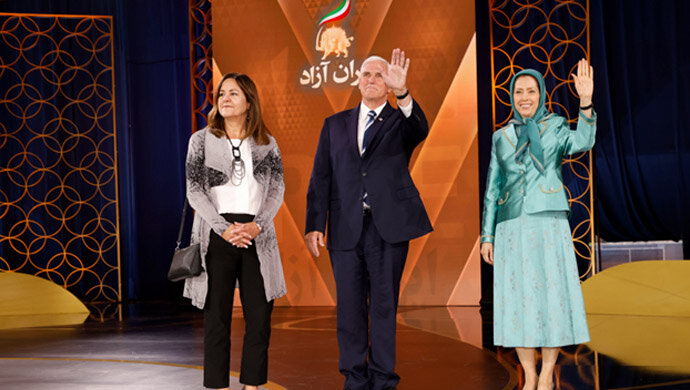
On September 28, 2012, the United States removed the Iranian terrorist group Mujahedin-e Khalq Organization (MKO or MEK) from its list of foreign terrorist organizations.
Then State Department Secretary of State Hillary Clinton made the decision in view of the so-called claim of publicly renouncing violence, the absence of confirmed acts of terrorism by the group for more than a decade, and their cooperation in the closure of their paramilitary base in Iraq.
The move meant that Washington will no longer block the group's property in the United States and that U.S. entities may engage in transactions with the MKO without obtaining a license.
The MKO terrorist group leader, Maryam Rajavi, who is residing in Paris welcomed the decision in a statement, vowing to step up its international campaign against the Islamic Republic and the Iranian people.
“This has been the correct decision, albeit long overdue, in order to remove a major obstacle in the path of the Iranian people's efforts for democracy," Rajavi said.
In 1988, 7000 MEK members joined hands with Saddam Hussein and formed an alliance called National Liberation Army of Iran (NLA). Saddam armed these forces. On July 26, 1988, only six days after the acceptance of United Nations Security Council Resolution 598 which ordered a ceasefire between Iran and Iraq, the so-called NLA crossed Iranian borders with a heavy aerial support from Saddam’s forces.
The NLA conducted over 100 military operations against the Iranians during the time they joined the Saddam army. If these operations do not account as examples of violence for Americans, what is their definition of violence?
“The main reason for de-listing the MEK from British, EU & U.S. terrorist lists (FTO) was the organization’s public claim - and subsequent legal guarantee - that they had renounced violence since 2001 and would continue to do so,” Reza Nasri, an international lawyer and legal expert, wrote on Twitter on Saturday.
However, a minor explosion in a southeastern Tehran in the Malek Ashtar Basij headquarters on Saturday night, resulted in minor infrastructure damage. In a statement, the MKO claimed responsibility for the explosion.
In their statement issued on the same night, the terrorist group claimed the attack was carried out by “revolutionary cells”.
“In light of this recent development, the UK, EU and U.S. - along with Canada - should seriously consider revising their past decision and designate MEK again as a terrorist organization,” Nasri continued in his thread of tweets.
According to the legal expert, aside from doing justice to the thousands of Iranian, Iraqi and Kurdish victims that were killed or maimed by this brutal cult over the years, designating MEK again would be viewed as a good-faith gesture that will have a positive impact on the ongoing JCPOA negotiations.
“This is the Western countries' opportunity to show good-faith, break the negotiations' deadlock and set the ground for a sustainable and long-term cooperation with Iran. Don't miss it!” Nasri noted, advising the Americans.
According to media sources, the issue of removing the Islamic Revolution Guards Corps from the Foreign Terrorist Organization (FTO) list is one of the hurdles that Tehran and Washington cannot agree on in the negotiations to revive the JCPOA.
On Saturday, Vahid Jalalzadeh, Head of the National Security and Foreign Policy Committee of the Iranian parliament said Tehran and Washington could not reach agreement on two issues in Doha held on Tuesday and Wednesday.
“One is the issue of our economic benefits, and the other is the issue of the ‘red list of the sanctions’. In this regard, we reached a list with the Europeans and the Americans in Vienna, and we said that this list should be removed from the red list, but the Americans said that they will again add these people to the red list if anything comes up,” Jalalzadeh continued.
The MP added that the U.S. is turning its back on its promise regarding the red “list of sanctions,” noting that it doesn’t work that way.
“We keep negotiating and the U.S. could add these people to the red list under any pretext? No. It doesn’t work that way,” he underlined.
Matthew Levitt, a Fromer-Wexler Fellow and director of the Reinhard Program on Counterterrorism and Intelligence at The Washington Institute, wrote an opinion piece in The Washington Institute on March 21 advising the Biden administration not to remove the IRGC from the FTO list.
The hypocrisy comes at a time, when several former U.S. officials attended the MKO rallies to get a few extra dollars for their election campaigns, and introduce the terrorist group as the best alternative for “a regime change” in Tehran. Mike Pompeo, the former secretary of state, and Mike Pence, the former vice president, who both served under Trump, were among those top guests.
However, the IRGC has always been and will continue to remain the main harbinger of internal security and regional stability. While Daesh (ISIS) was committing genocide in Iraq and Syria, especially from July 2014 to November 2017, the IRGC proved as the main force in defeating them.
Having refused to remove the IRGC from the FTO list, the U.S. has stubbornly been dead-set not to put the name of the MKO to its list of sanctions. By doing so, it once again shows the world how hypocrisy can hamper countries from their legal rights.
